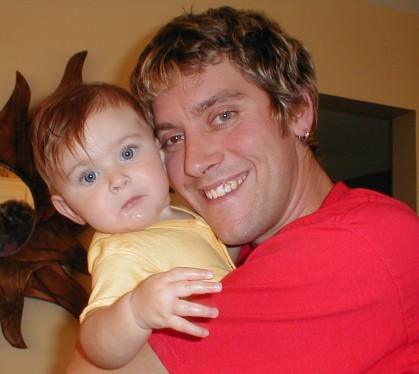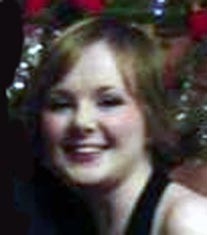
Scott Parsons
Hometown: Portugal Cove-St. Phillips, NL
How did you find out you were sick? What events led to the diagnosis?
For months prior to my diagnosis I was having, as cyclist Lance Armstrong describes it, vague feelings of unwellness. I’ve never heard, nor do I know a more accurate description. I’ve always been an athletic, active individual and had always considered myself a healthy person. But sometime around April of 2004 I started to feel tired most of the time. I developed shingles, a stress related condition that is quite uncommon for someone of my age and condition. I developed a lump in my breast, pain in my groin area (not in the location of the cancer) and my appetite suffered significantly – and I love food! I even became cranky and contrary. I just didn’t feel well. I knew something wasn’t right. But I had no idea. Frustrated and at a loss, my doctor requisitioned some blood work and an ultrasound. And on, of all days, Friday 13th (of August) 2004 my phone rang. It was my doctor’s office. The woman on the other end asked me to come in as soon as I was available – the doctor had my results. The first thought I had was “Weird… this is weird… he must’ve found something”. But I had no idea. When my turn came to see the doctor I walked in. One look at his face and I knew something was wrong. “Come in Scott” he said, “How are you feeling?” I quickly responded, “Pretty good – nothing to complain about”. But I had no idea. “Scott” he continued, “I have some good news and some bad news… the good news: we caught it early enough” My heart sank. “The bad news: it’s cancer”. I was numb.
What year was it? What was your age at the time?
It was 2004. Friday 13th (of August), 2004. I was 32.
At what level of education were you at diagnosis?
I had graduated from Business Management from College of the North Atlantic a year earlier.
Do you work? self-employed in the area of electrical energy production
What was your diagnosis?
I was diagnosed with testicular cancer. Not just testicular cancer – I had a Leydig Cell Tumour; it is so rare that doctors don’t even present it anymore as a possible diagnosis. To elaborate, of all testicular cancer cases, less than 2-3% are Leydig Cell. Luckily for me, and I do mean luckily, I had not developed a metastatic disease (because it was discovered so early).
What were your first thoughts when diagnosed?
I don’t really remember thinking anything. I felt it. When I heard “the bad news” I went numb. I was overcome with a hot wave of numbness. That’s the best description I know… overcome with a wave of heat that permeated every inch of my body, and in its wake I was left feeling numb. I remember trying to absorb everything the doctor was telling me. All I can remember is staring intensely at his mouth, his lips moving in slow motion. It was like tunnel vision. If you’ve ever been so exhausted and fatigued that you lost peripheral vision… that’s what it was like for me… I saw nothing but the doctors mouth as he spoke.
How did your family react?
I’ll never forget it. I walked into my home. I was a wreck, but I tried to maintain my composure. It quickly crumbled though when I saw my 6-month-old daughter and my wife. I burst into tears. Hysterical, I tried to relay everything the doctor had told me as best I could remember. My wife cried, gathered herself and took control. She sat me down with a cup of tea while she packed my bags for the hospital. She dressed our daughter, made arrangements to have her looked after and we proceeded to the hospital. She was so strong for me, but inside, she was terrified. My parents and siblings were in shock. They too were strong for me though. That’s the thing with Cancer… or at least for me…. everyone around me was strong for me. I can’t speak to how they felt in private, but in front of me, they all, without exception, put on the “game-face”. I know you understand.
How did your friends react?
My friends reacted with disbelief and shock. As far as they were concerned, I was healthy and strong – I played hockey with most of them only the night before I was diagnosed. Did they treat me any differently? Yes. They treated me with compassion and caring – not a “guy thing”. Some offered to help where they could, others spent time at my side. Others were just there for me… and for my family. My needs became very important to them.
What did your treatment consist of?
Medical Side: Medically, my treatment began with surgical removal of the tumour. Unfortunately, this meant removal of my testicle itself. An incision was made just above my waste through which the testicle was extracted. I was quite surprised actually, the procedure wasn’t as invasive as I had expected (or dreaded). I had expected a degree of disfigurement or mutilation but I was left with only a solitary scar… and not where I had feared.
Non-Medical Side: Overall I felt positive. Physically, I was in pain. Emotionally, I felt challenged. The physical pain was the easy part for me. Of course it was a great hindrance and kept me confined to bed most of the time, but my mind wandered. Death, something I had given little consideration before, if any, suddenly consumed my thoughts. I was saddened by thoughts of my daughter growing up without her daddy. I was angry that this disease had interrupted my life. I was conflicted though too. I was also able to recognize the fact that I was very lucky. I was alive… with family and friends who love me.
In which hospital(s) were you treated?
I underwent emergency surgery at the Health Sciences Centre in St. John’s, NL. I also traveled to the US to avail of a relatively new diagnostic tool called a PET (Positron Emission Tomography) scan. My local doctor didn’t necessarily condone the additional tests, but he understood that it couldn’t hurt and certainly didn’t try to dissuade me from going.
What is your current medical status?
Because Leydig Cell Tumours do not react to chemo or radiation, I must be observed on an ongoing basis for many years to come. Every 6 months I have to undergo ultrasounds and C/T scans to monitor my condition. I still have what is referred to as a micro-calcification in my right testicle that could potentially develop into a Leydig Cell Tumour as well, so I have to be watched very closely. Remember, once a Leydig Cell Tumour metastasizes, the chance of survival is 0%.
How is life different for you now post diagnosis (physically, emotionally, socially, spiritually)?
hope I’m a better person today. I try to be more positive in all aspects of my life. I try to treat others as I would have them treat me… something I’ve always tried to do. I try not to let the ‘little things’ bring me down… things can always get worse. I love like I’ve never loved before. I try to express my feelings more. But most of all, I live life more fully… like today may be my last… I don’t want to waste anymore time… because I now see that my life is finite. I will die.
What is/was the toughest part of your challenge?
The toughest part of my challenge involves my daughter. For months I couldn’t even hold her. Thoughts of her growing up without a daddy tormented me. All I wanted was to be there for her… forever… and cancer showed me that I didn’t have forever… it frightened me tremendously.
What is/was the best part of your challenge?
Simple. The best part of my challenge has to be that it has made me a better person… or at least, it has made me more aware of how I can become a better person. When I was first faced with Cancer, it immediately forced me to reflect on the person that I was… and I knew I needed to be a better person… I wasn’t entirely happy with who I was. Believe me, it hasn’t happened overnight, by any means, but everyday I’m trying to be more understanding, positive, receptive, patient, and caring. I’m trying to be more proactive. I’m trying to become more confident and take-charge. I realize now, the importance of living life more fully. I live more and work less. I don’t want to waste precious time, because it is precious, and I see that now.
What really motivated you to keep going while you were sick?
Life. This may seem like a gross generalization, but my desire to live life motivated me most. To spend time with my wife and daughter doing the things we enjoy – to see my daughter grow up – to really live a life on my own terms with my family. No more wasted time on trivial things… I wanted to love living life, and live loving life… I still had so much to live for.
What lessons or messages have you taken away from your experience?
The biggest lesson I’ve learned is that it can happen to me. I suddenly felt mortal. I quickly realized that I am not going to be alive forever and that I am responsible for moulding my own future. Life doesn’t just happen; I must create possibilities, act on opportunity and persevere. It is, after all, my life.
What are your thoughts and feelings about your illness now? How have they changed since before your diagnosis?
At the time of my diagnosis (because my condition is so rare) I couldn’t help thinking “Typical… leave it to me… I couldn’t just get sick… I had to develop a tumour that hasn’t been seen since before I was alive!”. Today, I think it’s kind of neat that I am the only person (in my lifetime), not only to develop a Leydig Cell Tumour, but also to survive a Leydig Cell Tumour. Somehow, on some level, I feel special. One thing is certain though: I do feel lucky.
What are some (if there are any you know of) preventative measures that people can take to lower their risk of having an experience like yours?
Unfortunately, the cause and origin of a Leydig Cell Tumour, like so many other cancers, is unknown. It is believed however, that it is not a lifestyle related disease and is more likely associated with the genetic predisposition of the individual.
How are you connected with Young Adult Cancer?
I knew Geoff Eaton as a child. When I was diagnosed with Cancer, I didn’t know anyone else who had a similar experience. I thought of Geoff a great deal during my treatment and recovery and he was the only person I knew who might understand what I was going through. I needed someone to talk to who could appreciate my challenge and Geoff Eaton was it. I believe, today’s youth are all too often overlooked. I have to commend Geoff, first for recognizing the need, and second for following up on his dream and everyone who has contributed to RealTime Cancer for making it the success it has become and continues to be. In a time when growing up, in itself, can be a challenge, it’s reassuring to know that there is somewhere to turn when all else seems hopeless… sometimes, the best medicine is just being able to relate to others… I think that’s the real strength of RealTime Cancer… peer support. Just knowing you’re not alone can be so therapeutic.









